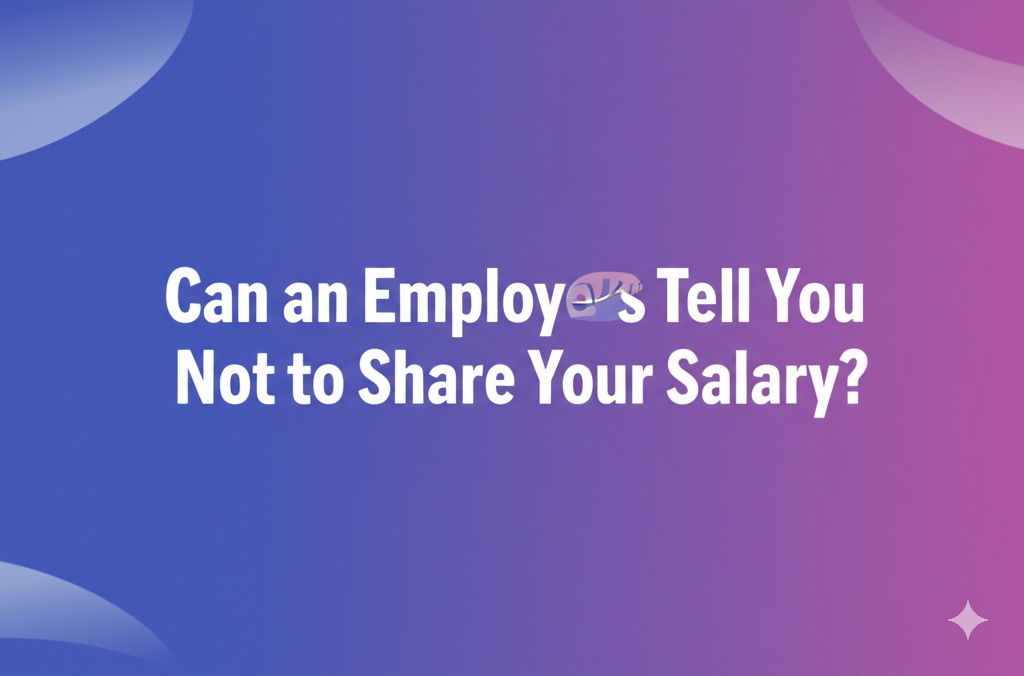
In today’s competitive job market, salary discussions can be a sensitive topic. Employees may wonder if their employer has the right to prevent them from sharing their salary information with coworkers or the public. Is there legal protection for salary transparency? Can employers impose restrictions on salary discussions? This article delves into the complexities surrounding salary confidentiality and what both employees and employers should understand about the matter.
What is Salary Confidentiality?
Salary confidentiality refers to the practice of keeping an employee’s compensation details private. Employers often request that employees do not share their salary information with coworkers, citing reasons such as maintaining workplace harmony and preventing dissatisfaction. However, many workers may feel uncomfortable with this request, especially when they believe they are being underpaid compared to their peers. So, where does the law stand on this issue?
Can an Employer Legally Prohibit Salary Disclosure?
The Legal Landscape
In many countries, including the United States, employees have the right to discuss their wages without fear of retaliation. Under the National Labor Relations Act (NLRA) in the U.S., employees are legally allowed to engage in “concerted activity,” which includes discussing wages or other working conditions. Employers are prohibited from interfering with these discussions, whether directly or indirectly, and cannot legally fire or discipline employees for sharing salary information.
In other parts of the world, the situation can vary. For example, the European Union’s transparency measures also promote pay equity and prohibit discriminatory practices. Countries like the UK have made strides toward encouraging pay transparency to combat gender pay gaps and other wage inequalities.
Exceptions to the Rule
However, there are some nuances to consider. In certain circumstances, employers may legally enforce policies about salary confidentiality. These can include roles with sensitive or proprietary information, such as executive positions or positions with access to financial data that could affect market conditions.
In the case of private companies or specific industries, there may be clauses in employment contracts or non-disclosure agreements (NDAs) that include salary secrecy provisions. In these cases, the enforceability of such agreements depends on the nature of the contract and local labor laws.
Why Do Employers Want to Keep Salary Information Confidential?
To Avoid Workplace Conflict
One of the primary reasons employers may discourage salary discussions is to prevent tension or resentment among employees. When employees compare salaries, it can sometimes lead to feelings of inequity, especially if there are disparities between employees performing similar roles. Keeping salaries private helps maintain a sense of fairness and can reduce the likelihood of conflicts arising from perceived unfair compensation.
To Protect Business Interests
Employers may also be concerned about how salary transparency could affect their competitive position. If employees share their salary details publicly, it could give competitors insights into the company’s pay structure, making it easier for them to poach employees or offer higher salaries. This is especially relevant in industries where talent acquisition and retention are key to success.
To Uphold Organizational Hierarchies
In some cases, employers may believe that salary secrecy helps maintain a clear organizational hierarchy. If employees were openly discussing their pay, it could blur the lines between entry-level, mid-level, and senior-level employees, potentially causing confusion about roles and responsibilities.
The Pros and Cons of Salary Transparency
Pros of Sharing Salary Information
- Promotes Fair Pay: When salaries are disclosed, employers are more likely to ensure that all employees are paid fairly for their work. It also helps uncover and address pay gaps related to gender, race, and other factors.
- Boosts Employee Morale: Transparency can increase trust between employers and employees, as everyone knows they are being compensated fairly for their work.
- Encourages Equal Opportunity: Salary transparency can reduce the risk of discriminatory pay practices by holding employers accountable.
Cons of Sharing Salary Information
- Potential for Conflict: Salary discussions can lead to dissatisfaction or jealousy if employees perceive that their peers are earning more or less than they are for similar work.
- Lower Negotiation Leverage: Employees who openly share their salary information may limit their ability to negotiate a higher salary in future positions, as potential employers can use this information to offer lower salaries.
- Privacy Concerns: Not everyone is comfortable sharing their salary information. Some employees prefer to keep their compensation details private, and forcing transparency could breach personal boundaries.
What Should Employees Do If Asked Not to Share Their Salary?
Understand Your Rights
If your employer requests that you do not share your salary information, the first step is to understand your rights. Research the labor laws in your jurisdiction, as these laws differ from region to region. In many cases, employers cannot legally prevent you from discussing your salary. In the U.S., for instance, federal law protects employees’ rights to discuss compensation. However, understanding the fine print of your employment contract and company policies is equally important.
Communicate With Your Employer
If you’re uncomfortable with your employer’s request, consider having an open discussion. Explain your concerns, and if necessary, seek advice from your human resources department or legal counsel to clarify your position. A constructive conversation can help clarify any misunderstandings and ensure that both parties are on the same page.
Be Aware of Potential Retaliation
While most employers cannot legally retaliate against employees for sharing salary information, some may attempt to discourage open discussions through subtle means, such as limiting career advancement opportunities or access to certain benefits. If you suspect retaliation, documenting incidents and seeking legal advice might be necessary.
Conclusion: Should You Share Your Salary?
Whether or not you share your salary information depends on a combination of legal, personal, and professional factors. Employers may request salary confidentiality, but they cannot always legally enforce it. It’s crucial to be aware of your rights and obligations, and to weigh the potential benefits and downsides of salary transparency. If you believe salary sharing can lead to a fairer and more equitable workplace, it may be worth advocating for a culture of openness in your organization.
However, if your employer’s policies or local laws prohibit this practice, make sure you fully understand the implications before discussing compensation. If in doubt, always consult legal or HR professionals to ensure you’re in the clear.

Andre Cuevas provides career insights, job search strategies, and professional advice to help individuals navigate the job market and achieve their career goals.






